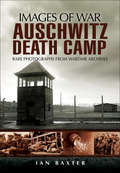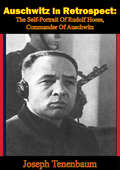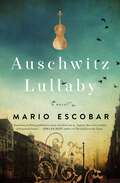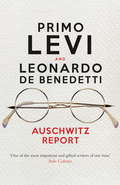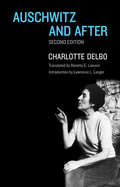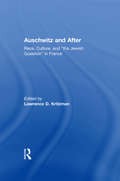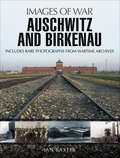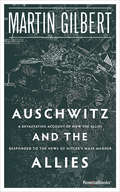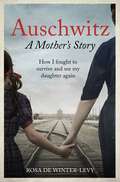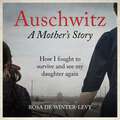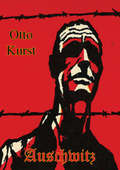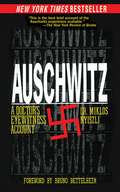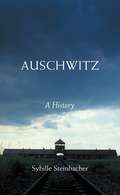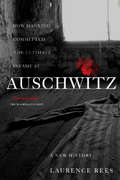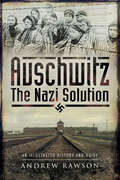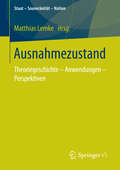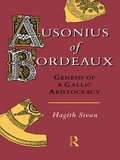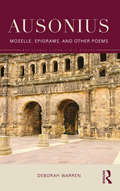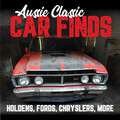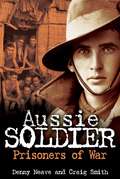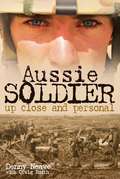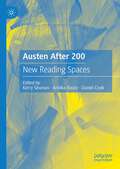- Table View
- List View
Auschwitz Death Camp: Rare Photographs from Wartime Archives (Images of War)
by Ian BaxterA World War II pictorial history detailing Nazi Germany&’s Auschwitz concentration camp, its monstrous creators, and what went on inside. The concentration camp at Auschwitz-Birkenau was the site of the single largest mass murder in history. Over one million mainly Jewish men, women, and children were murdered in its gas chambers. Countless more died as a result of disease and starvation. Auschwitz Death Camp is a chilling pictorial record of this infamous establishment. Using some 250 photographs together with detailed captions and accompanying text, it describes how Auschwitz evolved from a brutal labor camp at the beginning of the war into what was literally a factory of death. The images show how people lived, worked, and died at Auschwitz. The book covers the men who conceived and constructed this killing machine, and how the camp provided a vast labor pool for various industrial complexes erected in the vicinity. Auschwitz Death Camp is shocking proof of the magnitude of horror inflicted by the Nazis on innocent men, women, and children. Such evil should not be forgotten lest it reappear.
Auschwitz In Retrospect: The Self-Portrait Of Rudolf Hoess, Commander Of Auschwitz
by Joseph TenenbaumJoseph Tenenbaum sketches a portrait of the infamous "Commandant of Auschwitz", Rudolf Hoess."Rudolf Hoess has killed more people than any man in history, and Auschwitz was the greatest charnel house of all times. There has been no dearth of publications about the place or the person. [...] It seems that after a period of repudiation of the crimes and apologia for them, we are entering an era of memoirs by boastful generals and complacent Nazi small fry, eager to bask in the sun of regained self-confidence and unregenerate Nazi mentality.The Hoess memoirs are an exception to both trends. His revelations are neither apologetic nor an attempt at vindication. The memoirs are indeed a unique literary document, in which the author is trying to explain, first and foremost himself to himself, Hoess to Hoess, and incidentally also to shed light on the most hidden mainsprings of a mind gone criminal."--From Author's Preface
Auschwitz Lullaby: A Novel
by Mario EscobarAuschwitz Lullaby brings to life the story of Helene Hannemann—a woman who sacrificed everything for family and fought furiously for the children she hoped to save.On an otherwise ordinary morning in 1943, Helene Hannemann is preparing her five children for the day when the German police arrive at her home. Helene’s worst fears come true when the police, under strict orders from the SS, demand that her children and husband, all of Romani heritage, be taken into custody. Though Helene is German and safe from the forces invading her home, she refuses to leave her family—sealing her fate in a way she never could have imagined.After a terrifying trek across the continent, Helene and her family arrive at Auschwitz and are thrown into the chaos of the camp. Her husband, Johann, is separated from them, but Helene remains fiercely protective of her children and those around her. When the powers-that-be discover that Helene is not only a German but also a trained nurse, she is forced into service at the camp hospital, which is overseen by the notorious Dr. Mengele himself.Helene is under no illusions in terms of Dr. Mengele’s intentions, but she agrees to cooperate when he asks her to organize a day care and school for the Romani children in the camp. Though physically and emotionally brutalized by the conditions at Auschwitz, Helene musters the strength to protect the children in her care at any cost. Through sheer force of will, Helene provides a haven for the children of Auschwitz—an act of kindness and selflessness so great that it illuminates the darkest night of human history.Based on a true story, Mario Escobar’s Auschwitz Lullaby demonstrates the power of sacrifice and the strength of human dignity—even when all hope seems lost.
Auschwitz Report
by Primo Levi Robert S. Gordon Leonardo De BenedettiAmong the first written accounts of the concentration camps--a major literary and historical discovery.While in a Russian-administered holding camp in Katowice, Poland, in 1945, Primo Levi was asked to provide a report on living conditions in Auschwitz. Published the following year, it was subsequently forgotten and remained unknown to a wider public.Dating from the weeks and months immediately after the war, Auschwitz Report details the authors' harrowing deportation to Auschwitz, and how those who disembarked from the train were selected for work or extermination. As well as being a searing narrative of everyday life in the camp, and the organization and working of the gas chambers, it constitutes Levi's first lucid attempts to come to terms with the raw horror of events that would drive him to create some of the greatest works of twentieth-century literature and testimony. Auschwitz Report is a major literary and historical discovery.From the Trade Paperback edition.
Auschwitz and After
by Lawrence L. Langer Charlotte Delbo Rosette C. LamontWritten by a member of the French resistance who became an important literary figure in postwar France, this moving memoir of life and death in Auschwitz and the postwar experiences of women survivors has become a key text for Holocaust studies classes. This second edition includes an updated and expanded introduction and new bibliography by Holocaust scholar Lawrence L. Langer. "Delbo's exquisite and unflinching account of life and death under Nazi atrocity grows fiercer and richer with time. The superb new introduction by Lawrence L. Langer illuminates the subtlety and complexity of Delbo's meditation on memory, time, culpability, and survival, in the context of what Langer calls the 'afterdeath' of the Holocaust. Delbo's powerful trilogy belongs on every bookshelf."-Sara R. Horowitz, York University Winner of the 1995 American Literary Translators Association Award
Auschwitz and After: Race, Culture, and "the Jewish Question" in France
by Lawrence D. KritzmanBeginning with Marcel Ophus's documentary The Sorrow and the Pity (1970) there has been an attempt to question the idea of a totally unified, courageous and resistant wartime France. Even more startling have been the increasingly shocking revelations that the politics of collaboration were a mere extension of a deep-seated French anti-semitic tradition. In the shadow of these developments French writers and philosophers today are reflecting on the meaning of Jewish identity in the contemporary world. Auschwitz and After analyses for the first time how the memory of Auschwitz and the collaboration continue to haunt the French. These critical evaluations are accompianed by provocative essays on the "jewish Question" and the politics of race as they have been studied by writers, historians, philosophers and film makers in postwar France.
Auschwitz and Birkenau: Rare Photographs From Wartime Archives (Images of War)
by Ian BaxterA pictorial history of the two Nazi-German World War II concentration camps in Poland, featuring rare photographs from wartime archives. Auschwitz and Birkenau were separated from each other by about a forty-five-minute walk. Auschwitz was adapted to hold political prisoners in 1940 and evolved into a killing machine in 1941. Later that year a new site called Birkenau was found to extend the Auschwitz complex. Here a vast complex of buildings was constructed to hold initially Russian POWs and later Jews as a labor pool for the surrounding industries including IG Farben. Following the January 1943 Wannsee Conference, Birkenau evolved into a murder factory using makeshift houses which were adapted to kill Jews and Russian POWs. Later due to sheer volume Birkenau evolved into a mass killing machine using gas chambers and crematoria, while Auschwitz, which still held prisoners, became the administrative center. The images show first Auschwitz main camp and then Birkenau and are carefully chosen to illustrate specific areas, like the Women&’s Camp, Gypsy Camp, SS quarters, Commandant&’s House, railway disembarkation, the &“sauna,&” disinfection area, and the Crematoria. Maps covering Auschwitz and Birkenau explain the layout. This book is shocking proof of the scale of the Holocaust.
Auschwitz and the Allies: A Devastating Account of How the Allies Responded to the News of Hitler's Mass Murder
by Martin GilbertA thorough analysis of Allied actions after learning about the horrors of Nazi concentration camps—includes survivors&’ firsthand accounts. Why did they wait so long? Among the myriad questions of what the Allies could have done differently in World War II, understanding why it took them so long to respond to the horrors of the Nazi concentration camps—specifically Auschwitz—remains vital today. In Auschwitz and the Allies, Martin Gilbert presents a comprehensive look into the series of decisions that helped shape this particular course of the war, and the fate of millions of people, through his eminent blend of exhaustive devotion to the facts and accessible, graceful writing. Featuring twenty maps prepared specifically for this history and thirty-four photographs, along with firsthand accounts by escaped Auschwitz prisoners, Gilbert reconstructs the span of time between Allied awareness and definitive action in the face of overwhelming evidence of Nazi atrocities. &“An unforgettable contribution to the history of the last war.&” —Jewish Chronicle
Auschwitz – A Mother's Story: How I fought to survive and see my daughter again
by Rosa de Winter-LevySuddenly there is a blow to my face, I am hurled to one side. 'My child, I have to go with her!' I scream. But Dr Mengel is standing before me, whip raised. 'Maul halten, shut up!' His eyes gleam. Filled with fear I cower down.In 1943, as the Nazi power swept across central Europe, Rosa, her husband Emanuel and their daughter, Judy, were forced into hiding. But after a year and a half of living a terrifying, day-by-day existence, they were betrayed. As they arrived in Auschwitz, Rosa was torn from her husband and her only daughter. Could she dare to hope she would see either of them again?Somehow, Rosa fought the horror and humiliation of the camp, on occasion coming dangerously close to death. In nursing the people trapped beside her, she helped others survive, but tragically she also watched them die - including a mother she had met before, with a similar story and a daughter the very same age. Her name was Edith Frank.Written immediately in the months after the war, Auschwitz - A Mother's Story tells Rosa de Winter-Levy's unique and heart-breaking personal story - from the atrocities of the camp to her journey out of hell. Powerful and affecting, it is the testimony of a mother, and the pain she will endure for the chance to hold her child again.It's night. The door opens and along with 500 other women I am taken to the so-called Krätzeblock, the scabies block. Mice and rats run over us, the women scream and cry, it's almost unbearable. There's no chance of sleep, we're all consumed by the same thought: tomorrow our final hour will have come.
Auschwitz – A Mother's Story: How I fought to survive and see my daughter again
by Rosa de Winter-LevySuddenly there is a blow to my face, I am hurled to one side. 'My child, I have to go with her!' I scream. But Dr Mengel is standing before me, whip raised. 'Maul halten, shut up!' His eyes gleam. Filled with fear I cower down.In 1943, as the Nazi power swept across central Europe, Rosa, her husband Emanuel and their daughter, Judy, were forced into hiding. But after a year and a half of living a terrifying, day-by-day existence, they were betrayed. As they arrived in Auschwitz, Rosa was torn from her husband and her only daughter. Could she dare to hope she would see either of them again?Somehow, Rosa fought the horror and humiliation of the camp, on occasion coming dangerously close to death. In nursing the people trapped beside her, she helped others survive, but tragically she also watched them die - including a mother she had met before, with a similar story and a daughter the very same age. Her name was Edith Frank.Written immediately in the months after the war, Auschwitz - A Mother's Story tells Rosa de Winter-Levy's unique and heart-breaking personal story - from the atrocities of the camp to her journey out of hell. Powerful and affecting, it is the testimony of a mother, and the pain she will endure for the chance to hold her child again.It's night. The door opens and along with 500 other women I am taken to the so-called Krätzeblock, the scabies block. Mice and rats run over us, the women scream and cry, it's almost unbearable. There's no chance of sleep, we're all consumed by the same thought: tomorrow our final hour will have come.
Auschwitz – A Mother's Story: How I fought to survive and see my daughter again
by Rosa de Winter-LevySuddenly there is a blow to my face, I am hurled to one side. 'My child, I have to go with her!' I scream. But Dr Mengel is standing before me, whip raised. 'Maul halten, shut up!' His eyes gleam. Filled with fear I cower down.In 1943, as the Nazi power swept across central Europe, Rosa, her husband Emanuel and their daughter, Judy, were forced into hiding. But after a year and a half of living a terrifying, day-by-day existence, they were betrayed. As they arrived in Auschwitz, Rosa was torn from her husband and her only daughter. Could she dare to hope she would see either of them again?Somehow, Rosa fought the horror and humiliation of the camp, on occasion coming dangerously close to death. In nursing the people trapped beside her, she helped others survive, but tragically she also watched them die - including a mother she had met before, with a similar story and a daughter the very same age. Her name was Edith Frank.Written immediately in the months after the war, Auschwitz - A Mother's Story tells Rosa de Winter-Levy's unique and heart-breaking personal story - from the atrocities of the camp to her journey out of hell. Powerful and affecting, it is the testimony of a mother, and the pain she will endure for the chance to hold her child again.It's night. The door opens and along with 500 other women I am taken to the so-called Krätzeblock, the scabies block. Mice and rats run over us, the women scream and cry, it's almost unbearable. There's no chance of sleep, we're all consumed by the same thought: tomorrow our final hour will have come.
Auschwitz, Auschwitz... I Cannot Forget You... As Long As I Remain Alive
by Max Rodrigues Garcia"This book is an important witness, representing millions of people whose only 'criminality' consisted of being been born a Jew. Max Garcia survived the Nazi death camps and saved his personal humanity without any hatred. That is a very personal victory over the barbarity, and it shows a real significance of his personality. The reader will be on an emotional roller coaster as the details of the worst and best of mankind come to life in this book. Max's story is one of brutal honesty and ultimately one of inspiration as a person restarts his life in a new land... by himself." Despite his excruciating ordeal, he was able not only to physically survive but to immigrate to a new country, to travel, to fulfill his career aspirations, to marry and have children, to forgive his tormentors, and to cope with his Post Traumatic Stress Disorder. Max's story shows the triumph of the human spirit in his desire to survive. The last section of the book, which was written by Max's children and grandchildren, shows how Max's experiences affected not only him but his entire family both positively and negatively and interpret the trauma of the Holocaust from a different perspective from Max's.
Auschwitz, the Allies and Censorship of the Holocaust
by Michael FlemingWhat was the extent of allied knowledge regarding the mass murder of Jews at Auschwitz during the Second World War? The question is one which continues to prompt heated historical debate, and Michael Fleming's important new book offers a definitive account of just how much the Allies knew. By tracking Polish and other reports about Auschwitz from their source, and surveying how knowledge was gathered, controlled and distributed to different audiences, the book examines the extent to which information about the camp was passed on to the British and American authorities, and how the dissemination of this knowledge was limited by propaganda and information agencies in the West. In a fascinating new study, the author reveals that the Allies had extensive knowledge of the mass killing of Jews at Auschwitz much earlier than previously thought; but the publicising of this information was actively discouraged in Britain and the US.
Auschwitz. A Gruelling Story Of Germany's Worst Hell-Camp
by Otto KurstOBJECTIVE: EXTERMINATION"There were in reality three Auschwitz camps...Auschwitz I...with its two ovens and the mild death rate of a thousand or so per day.Auschwitz II...where the death rate was stepped up to six thousand per day, with a world record of twenty-two thousand deaths in twenty-four hours.Auschwitz III was the labor camp...."In the labor camp, they had a grim motto: "Labor unto death." But all three camps were dedicated to the "problem of extermination." Fedor Schellenberg, too familiar with all three camps, was dedicated to the problem of survival....This book tells of the horrifying tortures and deaths in the most notorious of the Nazi extermination camps.
Auschwitz: A Doctor's Eyewitness Account (Holocaust Handbooks Ser. #Vol. 37)
by Bruno Bettelheim Richard Seaver Tibere Kremer Miklos NyiszliWhen the Nazis invaded Hungary in 1944, they sent virtually the entire Jewish population to Auschwitz. A Jew and a medical doctor, Dr. Miklos Nyiszli was spared from death for a grimmer fate: to perform "scientific research" on his fellow inmates under the supervision of the infamous "Angel of Death": Dr. Josef Mengele. Nyiszli was named Mengele's personal research pathologist. Miraculously, he survived to give this terrifying and sobering account.
Auschwitz: A History
by Sybille SteinbacherAt the terrible heart of the modern age lies Auschwitz. In a total inversion of earlier hopes about the use of science and technology to improve, extend and protect human life, Auschwitz manipulated the same systems to quite different ends. In Sybille Steinbacher's terse, powerful new book, the reader is led through the process by which something unthinkable to any European in the 1930s had become a sprawling, industrial reality during the course of the world war. How Auschwitz grew and mutated into an entire dreadful city, how both those who managed it and those who were killed by it came to be in Poland in the 1940s, and how it was allowed to happen, is something everyone needs to understand.
Auschwitz: A New History (Histoire Ser. #Vol. 6015861)
by Laurence ReesPublished for the 60th anniversary of the liberation of Auschwitz?a devastating and surprising account of the most infamous death camp the world has ever known.
Auschwitz: The Nazi Solution
by Andrew RawsonThe camps at Auschwitz-Birkenau were an important part of the Nazis' final solution to the Jewish question. Over one million people were murdered in its gas chambers and tens of thousands of prisoners were worked to death in the nearby sub-camps. Others were held in the quarantine area before they were deported to work in the Third Reich.This is the story of the development of Auschwitz from a Polish prison camp into a concentration camp, and a thorough account of the building of Birkenau and the gas chambers, which grew into industrial killing machines. Rawson relates what life was like for prisoners, revealing where the unsuspecting new arrivals came from and how they were greeted at the camp with the humiliating selection process; how many were tricked into entering the gas chambers, while others were stripped of their identity and put to work; how prisoners struggled to survive on a poor diet and no health care; how they faced a grinding daily routine with frequent punishments; and how the camps were organized from the commandants, their assistants and the guards, to the kapos and stuben who supervised work parties and the barracks. He details how a few brave souls tried to resist, how even fewer made a break for freedom and the heartbreaking story of liberation and life afterwards. There are instructions on how to get to nearby Krakow an ideal base and Auschwitz-Birkenau. Information on how best to spend your time there is also included, making this an invaluable book that is both a vivid account of life in the concentration camps and an essential guide for visitors who want to explore the past of this notorious site.
Ausnahmezustand: Theoriegeschichte – Anwendungen – Perspektiven (Staat – Souveränität – Nation)
by Matthias LemkeIn der Krise greift die Demokratie zum Ausnahmezustand - was das bedeutet, zeigen die Beitr#65533;ge dieses Bandes. Die Ausweitung der Kompetenzen der Regierung verspricht eine effektive Krisenabwehr, sei es im Falle von terroristischen Anschl#65533;gen, Ausschreitungen, #65533;bergriffen auf Polizeibeh#65533;rden oder bei Naturkatastrophen. Dass damit eine teils erhebliche Einschr#65533;nkung b#65533;rgerlicher Freiheitsrechte einhergeht, ist die Kehrseite der Medaille. Grund genug, die Auswirkungen des Ausnahmezustandes auf die Demokratie im Blick zu behalten.
Ausonius of Bordeaux: Genesis of a Gallic Aristocracy
by Hagith SivanIn the burgeoning field of late classical antiquity the authors of late Roman Gaul have served as a mine of information regarding the historical, cultural, political, social and religious developments of the western empire, and of Gaul in particular. Ausonius is outstanding among these authors for the extraordinary range of material which his writings illuminate. His family exemplifies the rise of provincial upper-classes in Aquitania through talent, ambition and opportunism. Fusing historical method with archaeological, artistic and literary evidence, Hagith Sivan interprets the political message of Ausonius' work and conveys the material reality of his lifestyle.
Ausonius: Moselle, Epigrams, and Other Poems (Routledge Later Latin Poetry)
by Deborah WarrenAusonius provides translations of the key works of Ausonius, an important later Latin poet whose poems detail the social and cultural life of Gaul and its environment. His often difficult and playful Latin is presented in English by the award winning poet Deborah Warren, enabling a new generation of students to use and understand the poems. With notes and commentary throughout, this volume will be important not only as an example of later Latin poetry but also as a window onto the Later Roman Empire and the beginnings of early Christian writing.
Aussie Classic Car Finds
by Luke WestEvery enthusiast dreams of unearthing a classic car - what Americans call barn finds. In Australia we find them in sheds, garages, carports and paddocks. Aussie Classic Car Finds uncovers automotive treasure from across the nation. Holdens, Fords, Chryslers and more. These sleeping beauties are often derelict, rare and valuable. Each discovery also unlocks a unique human interest story. Consequently, these dream machines are of great interest to petrolheads despite their poor condition. For many, a barn find is the Holy Grail of classic car ownership.
Aussie Soldier: Prisoners of War (Big Sky Publishing Ser.)
by Craig Smith Denny NeaveThe second book in the Aussie Soldier series, Aussie Soldier: Prisoners of War by Denny Neave and Craig Smith, details the lives of the men and women who found themselves on the wrong side of the wire. This collection of heartfelt stories and anecdotes from Australian POWs will take you on their very personal journeys. Surviving as a prisoner of war required as much strength of character as any hard fought battle. Some lived to tell their tales about extreme suffering, mateship and hardship and many would carry with them forever the memories of those who died. Almost 35,000 Australian service personnel were taken prisoner during the Boer War, World War 1, World War 2 and the Korean War. As POWs are relatively few in number, their stories often take a back seat when it comes to tales about battles and conflict situations. Like most soldiers, former prisoners do not like reliving the horrors of war and their time in captivity. This is a collection of the stories of our Australian POWs. Interviews, questionnaires, written records, images and letters provide an insight into captivity and the joy and fears that came with their release. These vivid and compelling stories highlight the contradictions of war: the compassion and generosity on the one hand and the cruelty, hate and indifference on the other.
Aussie Soldier: Up Close and Personal (Big Sky Publishing Ser.)
by Craig Smith Denny NeaveThis book is a collection of short stories, diary extracts, letters, anecdotes and quotes from past and present serving soldiers. From WW1 to modern day conflicts, this book is an up close and personal perspective of what the soldier regards as his core values. These include compassion, mateship, courage, initiative, loyalty, integrity and trust. Aussie Soldier includes a 30-page battle book that summarises some of Australia's most famous battles.
Austen After 200: New Reading Spaces
by Daniel Cook Kerry Sinanan Annika BautzAusten After 200 explores our contemporary relationship with Jane Austen in the wake of the bicentenaries of her death and the first publication of her novels. The volume begins by looking at Austen’s popular appeal and at how she is consumed today in diverse cultural venues such the digisphere, blogosphere, festivals and book clubs. It then offers new approaches to the novels within various critical contexts, including adaptation studies, fan fiction, intertextuality, and more. Collecting these new essays in one volume enables a unique view of the crossovers and divergences in engagements with Austen in different settings, and will help a comparative approach between the popular and the academic to emerge more fully in Austen studies. The book gathers insights from a range of contributors invested in new reading spaces in order to show the creative ways in which we are all adapting as we continue to read Austen’s works.
